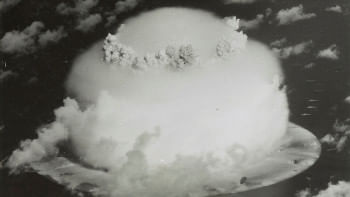Russian Muppets or American Puppets?

Westerners have spent two decades wondering why the Russian people have fallen under the spell of Vladimir Putin. Diplomats, historians, economists, and pundits have all failed to provide a satisfying explanation. But where academics and strategists have failed, perhaps the denizens of Sesame Street, from Kermit the Frog to Elmo, might succeed.
It was 1996. My homeland was in the midst of "shock therapy" – the rapid liberalisation and privatisation of its economy by decree, after the Soviet Union's fall – and I was at Princeton working on my doctorate. One day, a report about Russia on CNN caught my attention. Unusually, it was not about a killing or business takeover or an oligarch's rise or fall – negative coverage delivered with a holier-than-thou tone that never failed to rankle. Instead, it is a seemingly positive story: the Muppets were headed to Moscow.
But listening to the CNN host's arrogant commentary, my relief quickly gave way to frustration. The establishment of a Sesame Street in Russia was not, apparently, an example of cultural cross-pollination, enabled by the country's opening. Rather, Miss Piggy and Big Bird would ensure that American democratic sensibilities took root in the hearts and minds of children across the vast post-Soviet space – not just in Russia, but also in Estonia, Ukraine, Georgia, and other former Soviet republics. I changed the channel.
A children's television show, defined by its positive messages about learning and sharing, was being twisted into propaganda, presented as a form of pedagogical salvation, and used as yet another declaration of America's Cold War victory. But Russia had its own rich culture, which included not only Tolstoy and the Bolshoi, but also "Good Night, Little Ones!" a Soviet children's show as clever and warm-hearted as Sesame Street.
Fortunately, the team behind Sesame Street did not succumb to the attitude of moral superiority and cultural contempt that pervaded US news reports and was likely internalised by many ordinary Americans. On the contrary, according to a new book by Natasha Lance Rogoff – who, in the early 1990s, was an executive producer in charge of bringing the Muppets to Russia – the story of the show's formation for Russian audiences was one of genuine cultural cooperation, not condescension or conquest.
In Muppets in Moscow: The Unexpected Crazy True Story of Making Sesame Street in Russia, Lance Rogoff does not shy away from the story's political thread. She openly admits that USAID and then-Senator Joe Biden "spearheaded congressional support for an international Sesame Street," touting the Muppets as "ideal ambassadors to model democratic values and the benefits of a free-market economy to children in the former Soviet Union." But she also explains that "translating Sesame Street's ebullient and idealistic outlook to Mother Russia was not only incredibly difficult, but also incredibly dangerous."

Lance Rogoff's narrative includes bizarre, sordid, and all-too-human details about the morbid racketeering of the early post-Soviet years, when journalists and businesspeople were murdered on spec and Miss Piggy could be embraced as a role model for the utterly ruthless. Her rationalising, normalising, and modernising of the post-Soviet system reminded me of David Remnick's insights, in his 1994 book Lenin's Tomb: The Last Days of the Soviet Empire, into how Mikhail Gorbachev's perestroika transformed Russia.
Perhaps most important, Lance Rogoff shows that, even if Russia's Sesame Street was fundamentally an American show, it was not about America. It certainly was not designed to serve as American propaganda. Instead, it depicted basic human values like friendship and communication – as much for the Russians and Americans who put the show together as for viewers across the former Soviet Union.
Watching Sesame Street while on a visit to Moscow in 1996 – not long after seeing that CNN report – I was pleased to encounter a generous, sweet, and very well-produced show, which contained tie-in stories from the American original as well as unique stories with Russian puppets. The show's creators had clearly worked hard to develop characters that would resonate with Russians, from the problem-solving orange monster Kubik to the imaginative pink Muppet Businka. Zeliboba – a fuzzy, red-nosed house spirit, dressed in a leaf-covered cloak – was probably the most interesting (and certainly the most polarising).
Lance Rogoff does sometimes fall prey to cliché. There are too many "Boris and Natasha" moments, with Russians being depicted as cartoonish stereotypes – absurd, bumbling, affected, and heavily accented. For example, one of the female tycoons involved in the show, Irina Borisova, clicks toward a meeting late in Christian Louboutin stilettos. And the late Boris Berezovsky, who was approached for funding, calls "Bik Burd," an "i-cone" of American culture, "as famous as Elvis Pray-esly."
Nonetheless, Lance Rogoff deserves praise not only for her storytelling, but also for her perseverance and devotion, without which Russian Sesame Street would not have happened. That would have been a loss for Russian children. As Borisova explained when she decided to offer funding, "every self-respecting individual understands that it's time to do something for Russian children, but unfortunately, very little gets done – except talk." At a time when Russia was "changing so quickly" – and was "still very violent" – she believed that a "show like Sesame Street could model for our people how to live in a peaceful society."
The key, as Lance Rogoff understood, was to show, not tell – to act in good faith, with decency and humanity, rather than delivering contemptuous, self-aggrandising lectures. In the 1990s, Russians were mimicking all things American. But they were also deeply conflicted, as reflected in the debates Lance Rogoff describes over Rachmaninoff and rock and roll. Russian culture is marked by extremes, and the oscillation between imitating Western models and violently rejecting them is no exception.
Russian children watched Sesame Street for nearly 15 years – until 2010. Lance Rogoff says it was taken off the air because Putin no longer saw any use for it. The fact that many other cultural collaborations also ended at around the same time supports her case. Putin had decided that Russian culture must be of and by Russians – and only he could decide what Russianness meant.
In the 1990s, Russian society was so shattered by the breakdown of the communist order that it lost touch with its own values. But that did not mean it was going to become an American knockoff. Sesame Street worked because it embodied universal values. One wonders whether the Russian reality would be different today if more Americans had understood this.
Copyright: Project Syndicate, 2023.
www.project-syndicate.org
(Exclusive to The Daily Star)
Nina L Khrushcheva, professor of International Affairs at The New School, is the co-author (with Jeffrey Tayler) of "In Putin's Footsteps: Searching for the Soul of an Empire Across Russia's Eleven Time Zones" (St. Martin's Press, 2019).

 For all latest news, follow The Daily Star's Google News channel.
For all latest news, follow The Daily Star's Google News channel. 






Comments